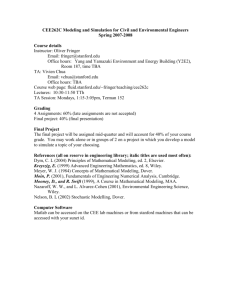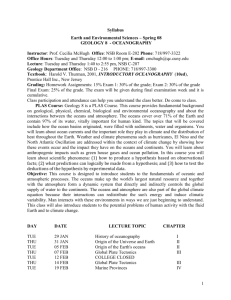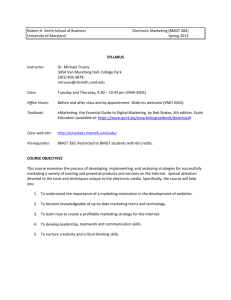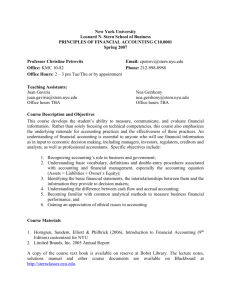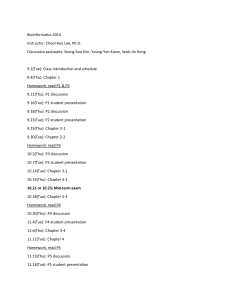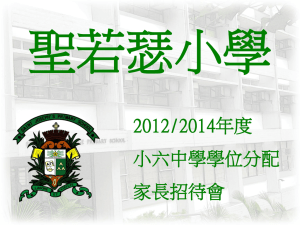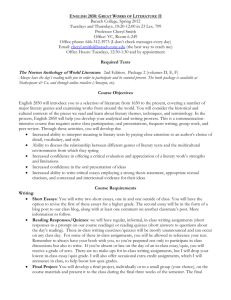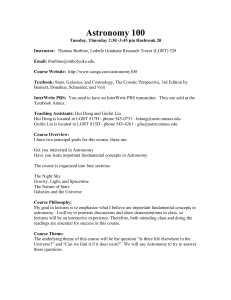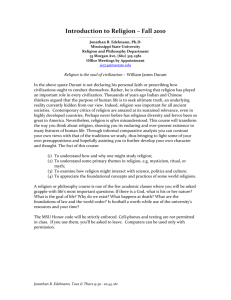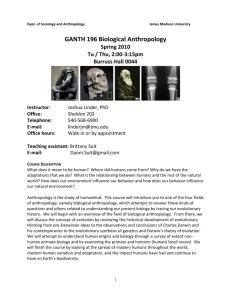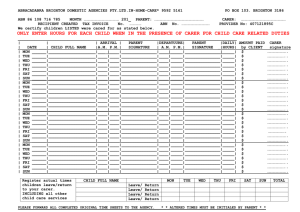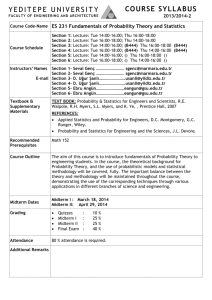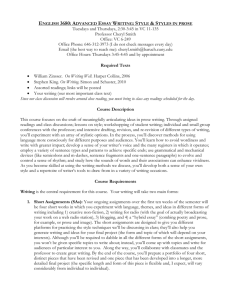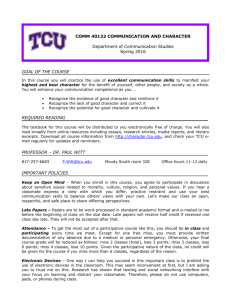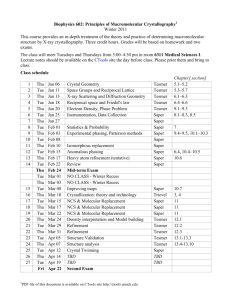History 395: Junior Seminar
advertisement
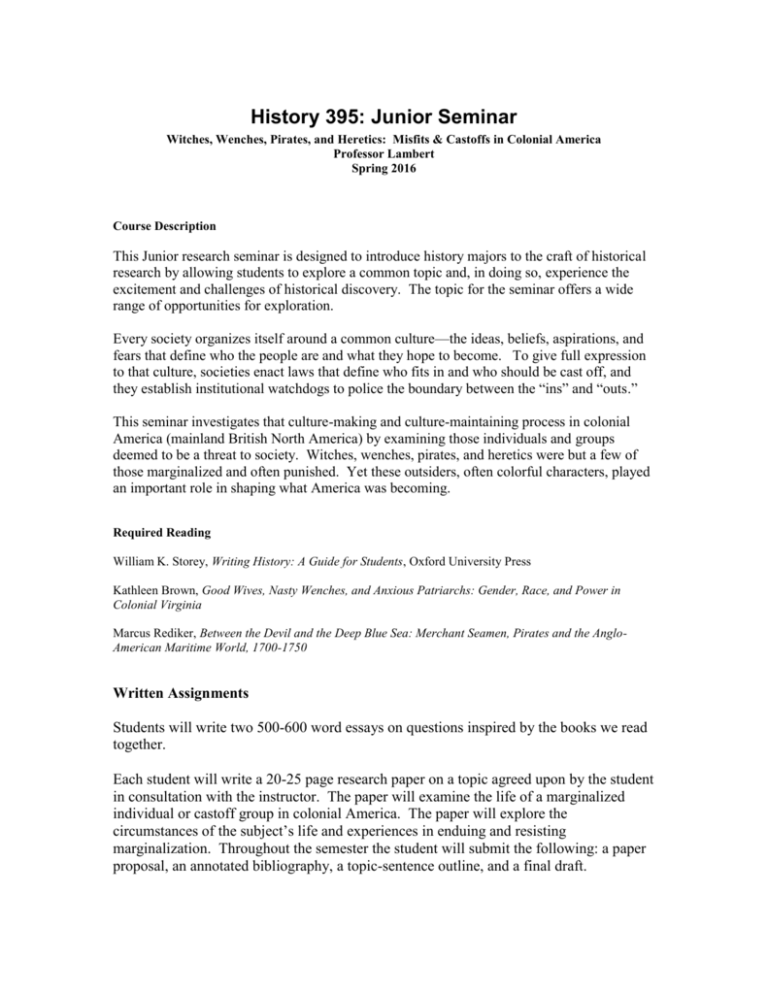
History 395: Junior Seminar Witches, Wenches, Pirates, and Heretics: Misfits & Castoffs in Colonial America Professor Lambert Spring 2016 Course Description This Junior research seminar is designed to introduce history majors to the craft of historical research by allowing students to explore a common topic and, in doing so, experience the excitement and challenges of historical discovery. The topic for the seminar offers a wide range of opportunities for exploration. Every society organizes itself around a common culture—the ideas, beliefs, aspirations, and fears that define who the people are and what they hope to become. To give full expression to that culture, societies enact laws that define who fits in and who should be cast off, and they establish institutional watchdogs to police the boundary between the “ins” and “outs.” This seminar investigates that culture-making and culture-maintaining process in colonial America (mainland British North America) by examining those individuals and groups deemed to be a threat to society. Witches, wenches, pirates, and heretics were but a few of those marginalized and often punished. Yet these outsiders, often colorful characters, played an important role in shaping what America was becoming. Required Reading William K. Storey, Writing History: A Guide for Students, Oxford University Press Kathleen Brown, Good Wives, Nasty Wenches, and Anxious Patriarchs: Gender, Race, and Power in Colonial Virginia Marcus Rediker, Between the Devil and the Deep Blue Sea: Merchant Seamen, Pirates and the AngloAmerican Maritime World, 1700-1750 Written Assignments Students will write two 500-600 word essays on questions inspired by the books we read together. Each student will write a 20-25 page research paper on a topic agreed upon by the student in consultation with the instructor. The paper will examine the life of a marginalized individual or castoff group in colonial America. The paper will explore the circumstances of the subject’s life and experiences in enduing and resisting marginalization. Throughout the semester the student will submit the following: a paper proposal, an annotated bibliography, a topic-sentence outline, and a final draft. Directions for these submissions will be discussed in class. All assignments will be submitted on Blackboard. NB Late submissions of assignments may result in a grade reduction. Class Attendance Students are expected to attend and participate in every class. Every student is responsible for announcements and assignments made in class, whether or not the student is present. Office Hours 9:00 to 11:00 Wednesdays, or by appointment UNIV 313 Class Schedule Tue Jan 12 Introduction of the question of outsiders in American history. Read Good Wives Thu Jan 14 The question of wives, wenches, and patriarchs considered Tue Jan 19 Examination of wives, wenches, and patriarchs continued Thu Jan 21 Submit essay on gender, class, and race as marker for “outsider” status. Read Writing History Tue Jan 26 The discipline and craft of writing historical essays Thu Jan 28 Discussion of the craft continued Tue Feb 2 No Class Defining Research Topic and Developing Bibliography Thu Feb 4 No Class Defining Research Topic and Developing Bibliography. Submit paper proposal, including topic, scope, and historical question as well as a preliminary bibliography. Tue Feb 9 Discussing pirates in American history. Read Devil and Deep Blue Sea Thu Feb 11 Discussing pirates in American history. Tue Feb 16 Submit essay on pirates in American history Thu Feb 18 Individual meetings with students on research papers Tue Feb 23 No Class Library Research Thu Feb 25 No Class Library Research Tue Mar 1 No Class Library Research Thu Mar 3 No Class Library Research Tue Mar 8 No Class Library Research. Submit annotated bibliography Thu Mar 10 No Class Library Research Tue Mar 15 No Class Spring Vacation Thu Mar 17 No Class Spring Vacation Tue Mar 22 Roundtable discussion of research Thu Mar 24 Individual meetings with students on progress Tue Mar 29 No Class Library Research Thu Mar 31 No Class Library Research. Submit topic sentence outline. Tue Apr 5 No Class Library Research and Writing Thu Apr 7 No Class Library Research and Writing Tue Apr 12 No Class Library Research and Writing Thu Apr 14 No Class Library Research and Writing Tue Apr 19 No Class Library Research and Writing Thu Apr 21 No Class Library Research and Writing Tue Apr 26 In-class discussion of student papers Thu Apr 28 In-class discussion of student papers. Mon May 2 Submit final paper. Disclaimers ACADEMIC INTEGRITY Purdue University and this professor prohibit “dishonesty in connection with any University activity. Cheating, plagiarism, or knowingly furnishing false information to the University are examples of dishonesty.” (University Regulations, Part 5, Section III, B, 2, a). In this class it will lead to a failing grade (0) on the assignment. Depending on the severity of the incident it may lead to further consequences. And you should know that faculty members are expected to report all cases of plagiarism to the Office of the Dean of Students. For a set of helpful guidelines, see: https://www.purdue.edu/odos/osrr/academic-integrity-brochure/ Plagiarism occurs when a writer deliberately uses someone else’s language, ideas, or other original (not commonknowledge) material without acknowledging the source. This definition applies to texts published in print or online, to manuscripts, and to the work of any writer, including other student writers. Plagiarism means reproducing or paraphrasing the words or ideas of someone else without proper attribution, and passing this work off as one's own. For more discussion of academic dishonesty, see the Online Writing Lab’s discussion and guidelines for avoiding plagiarism at: http://owl.english.purdue.edu/owl/resource/589/01/ UNIVERSITY EMERGENCY POLICY In the event of a major campus emergency, course requirements, deadlines, and grading percentages are subject to changes that may be necessitated by a revised semester calendar or other circumstances. Any changes will be posted, once the course resumes, on the course website. Here are ways to get information about changes in this course: my email address flambert@purdue.edu, my phone 765-12-3586, and the History Department main office phone: 494-4132. You are expected to read your @purdue.edu email on a frequent basis. EMERGENCY PREPAREDNESS Please review the Emergency Preparedness website: http://www.purdue.edu/ehps/emergency_preparedness/index.html

